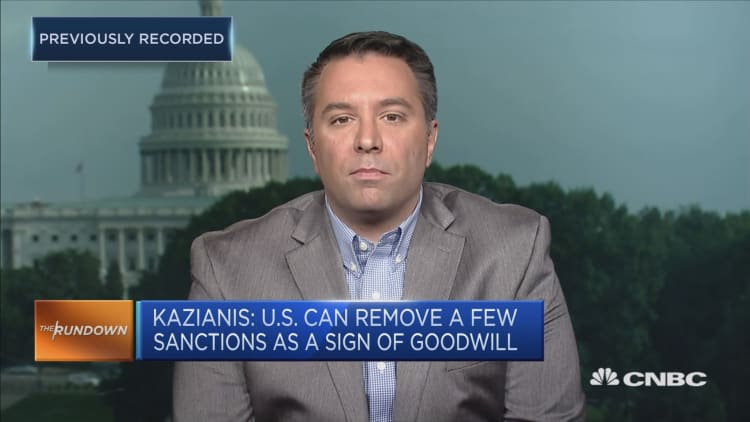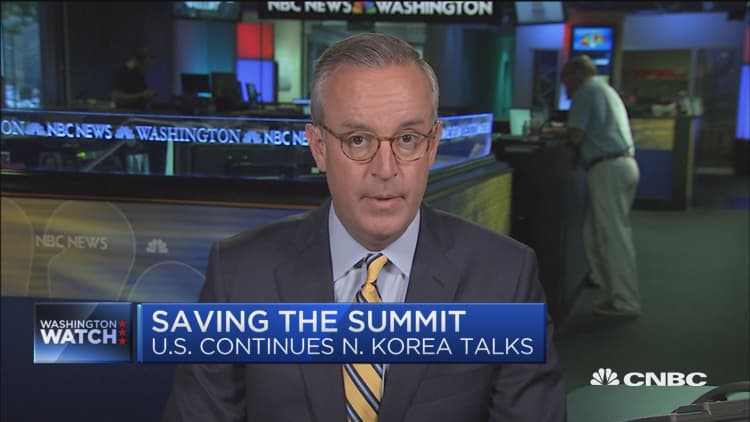
If the nuclear talks between President Donald Trump and North Korean leader Kim Jong Un do actually happen, as they are once again planned for June 12, it will mark the culmination of a long and unusual path.
Just last year, Kim and Trump were exchanging insults and threats. Now they're on the verge of a historic summit – apparently.
"One has to treat this like a soap opera," Vipin Narang, a professor at MIT who studies nuclear proliferation, told CNBC. "Every day brings a new, mostly predictable twist, but just stay tuned for the finale and to see if the season will be renewed for next year."
Since March 8, when Trump first agreed to meet with Kim, the president has canceled the summit, which was set for June 12 in Singapore. Likewise, North Korea has threatened to exit negotiations, and its negotiators failed to show up to attend a planning meeting. On Friday, Trump confirmed the summit was back on.
According to the White House, teams are working in the demilitarized zone between North and South Korea and in Singapore. On Friday, top North Korean diplomat Kim Yong Chol met with Trump in the Oval Office.
"I think that anybody who has negotiated with North Korea in the past knows that these changes, threats, not showing up — that's not really new in North Korean behavior," said Lisa Collins, a fellow with the Korea Chair at the Center for Strategic and International Studies. "What's different here is the personalities involved, which is Kim Jong Un and Donald Trump."
Here is a timeline of how things have developed in the U.S. relationship with North Korea since Trump took office.
North Korea taunts Trump administration with missile tests
North Korea launched its most aggressive year yet for missile testing less than a month into the Trump administration. The regime tested the KN-15 (Pukkuksong-2) medium range ballistic missile in February.
By the summer, the country launched its first intercontinental missile on July 4, which is Independence Day in the U.S. The Hwasong-14 long-range intercontinental ballistic missile had the capacity to reach the continental United States, according to experts.
Read more: A timeline of North Korea's nuclear tests in Trump's first year
In September, Kim tested the country's most powerful nuclear missile. The country claimed the test was a "perfect success," and experts agreed that the detonation was larger than any from the reclusive country's previous testing.
'Fire and fury like the world has never seen'
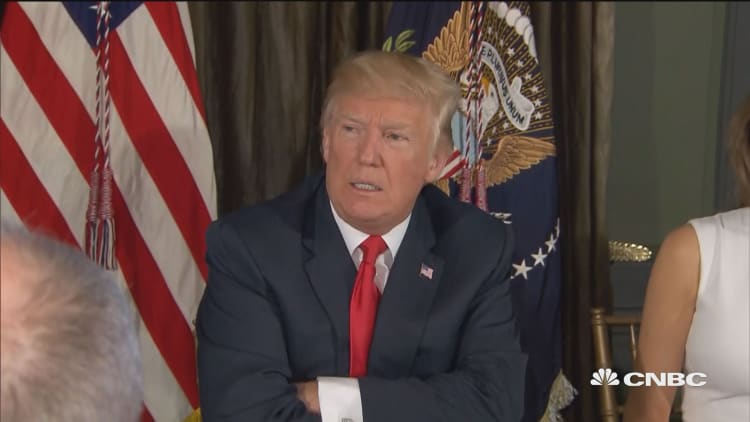
"North Korea best not make any more threats to the United States," Trump told reporters Aug. 8, from his golf club in Bedminster, N.J. "They will be met with fire and fury like the world has never seen. He has been very threatening ... and as I said they will be met with fire, fury and frankly power, the likes of which this world has never seen before."
Trump's warning came the same day that news outlets reported North Korea could fit miniaturized nuclear devices inside its missiles, a key step in its nuclear program that upped the ante for U.S. defense strategists.
Shortly after Trump's remarks, North Korea responded by threatening to strike Guam, an American territory in the Pacific ocean.
Trump tells Tillerson not to bother with 'Little Rocket Man'
Trump chided his then-secretary of State publicly over attempts to negotiate with North Korea in an October Twitter post, writing that he told "Rex Tillerson, our wonderful Secretary of State, that he is wasting his time trying to negotiate with Little Rocket Man."
Trump publicly adopted the "Rocket Man" monicker for North Korea's leader the month before, first tweeting that he had asked South Korean leader Moon Jae-in "how Rocket Man is doing."
That month, he also referred to "Rocket Man" at a campaign rally for Luther Strange in Alabama, and in front of the United Nations General Assembly in New York, where he said that "Rocket Man is on a suicide mission for himself and for his regime."
Five months later, the president fired Rex Tillerson as secretary of state and tapped then-CIA Director Mike Pompeo to lead the agency.
Trump agrees to a summit
The first confirmation of a summit between American and North Korean leadership came March 8, in a statement from a South Korean diplomat.
South Korean National Security Advisor Chung Eui-Yong made the announcement outside the White House, saying that Kim Jong Un had expressed "eagerness" to meet with Trump in conversations with South Korea. The announcement followed a hint from Trump, who told reporters in the White House press room that a big announcement was coming later in the day.
Pompeo meets Kim in North Korea
In April, Trump confirmed reports that Pompeo had made a secret diplomatic trip over Easter weekend to North Korea.
"Meeting went very smoothly and a good relationship was formed," Trump tweeted April 18. "Details of Summit are being worked out now."
The day before, Trump said that meetings had taken place at "at extremely high levels," but did not provide more details until The Washington Post broke the news of the visit from the CIA director.
Previous high-level visits occurred in 2000, when then-Secretary of State Madeleine Albright met with Kim Jong Il, Kim Jong Un's father and predecessor, and again in 2014, when then-Director of National Intelligence James Clapper visited the country to secure the release of two Americans: Kenneth Bae and Matthew Todd Miller.
Moon Jae-in and Kim meet for inter-Korean summit
Leaders of North and South Korea met April 27 for what was only the third inter-Korean summit since the 1953 signing of the armistice that ceased fighting in the Korean War. The summit was also the first in more than a decade, since the previous two summits in 2000, which ended in failure.
The historic summit included the signing of the Panmunjom Declaration for Peace, Prosperity and Unification on the Korean Peninsula, which committed the two countries to a denuclearized peninsula and an official end to the war. Both leaders also briefly crossed into the territory of the other country.
Trump exits Iran nuclear deal
Trump announced May 8 that he would withdraw the United States from the Joint Comprehensive Plan of Action with Iran, or the Iran nuclear deal, fulfilling a central campaign promise and undoing one of President Barack Obama's signature foreign policy achievements.
The move was also thought to influence Trump's dealings with North Korea.
"It would be hard to even come up with a plausible reason why North Korean leader Kim Jong Un would be willing to negotiate in good faith and come up with a deal after this," U.S. Army Lt. Col. Daniel Davis, a senior defense fellow for Defense Priorities, told CNBC at the time.
North Korea frees three Americans
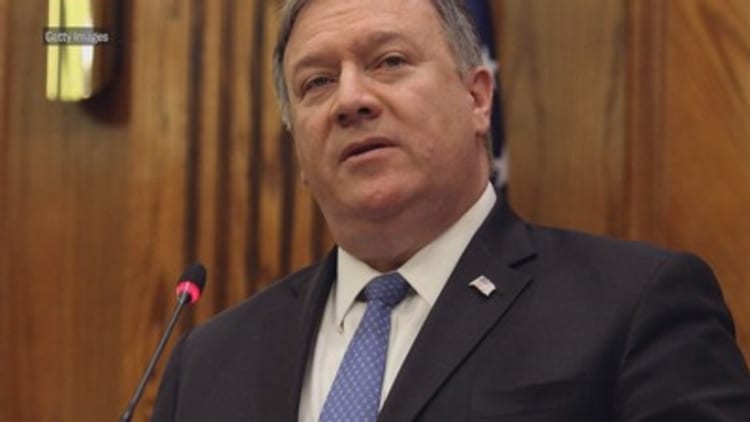
North Korea released three Americans May 10 following a second visit from Pompeo. It marked the first release since 22-year-old Otto Warmbier was returned to the United States shortly before his death.
"We're starting off on a new footing," Trump said at the time.
Experts were divided on whether the return of hostages would prove to be a significant step toward denuclearizing the peninsula.
Trump cancels summit
Sadly, I was forced to cancel the Summit Meeting in Singapore with Kim Jong Un.
Trump announced his decision to cancel the summit in a letter released by the White House on May 24. The decision followed broadsides from North Korean leadership, including Vice Minister of Foreign Affairs Choe Son Hui calling the American Vice President Mike Pence a "political dummy."
The North had previously canceled a meeting with South Korea in anger over joint military drills it was holding with the United States, and threatened to pull out of the summit with the United States if Trump insisted on ridding the country of its nuclear weapons.
"I was very much looking forward to being there with you. Sadly, based on the tremendous anger and open hostility displayed in your most recent statement, I feel it is inappropriate, at this time, to have this long-planned meeting," Trump wrote in his letter, apparently canceling the summit.
White House says summit is still 'expected'
Just days after Trump issued the letter apparently canceling the summit with North Korea, White House Press Secretary Sarah Huckabee Sanders appeared to un-cancel it.
"The United States continues to actively prepare for President Trump's expected summit with leader Kim in Singapore," she said in a statement Tuesday.
The White House confirmed that preparations for the summit were ongoing in multiple countries, with teams in Singapore and the Korean peninsula. Pompeo, she said, would meet with Kim Jong Un's top negotiator, Kim Yong Chol, in New York.
CIA says North Korea won't give up its weapons (but may allow a burger restaurant)
North Korea will not give up its nuclear weapons, but it may be open to allowing a western burger chain to open a franchise in the country, according to a CIA analysis that three U.S. officials discussed with NBC News for an article published Tuesday.
The analysis was consistent with expert opinion. It is "unimaginable" that North Korea would immediately give up its nuclear weapons, according to Siegfried Hecker, a Stanford professor whose analysis was recently published in The New York Times.
The CIA did not specify which burger chain North Korea was considering, according to NBC News. It did say, however, that Kim wanted the chain to serve food during summit negotiations.
That would fit in with Trump's wishes as a presidential candidate, when he said that his North Korean nuclear negotiators "should be eating a hamburger on a conference table, and we should make better deals with China and others and forget the state dinners."
Trump says the summit is back on
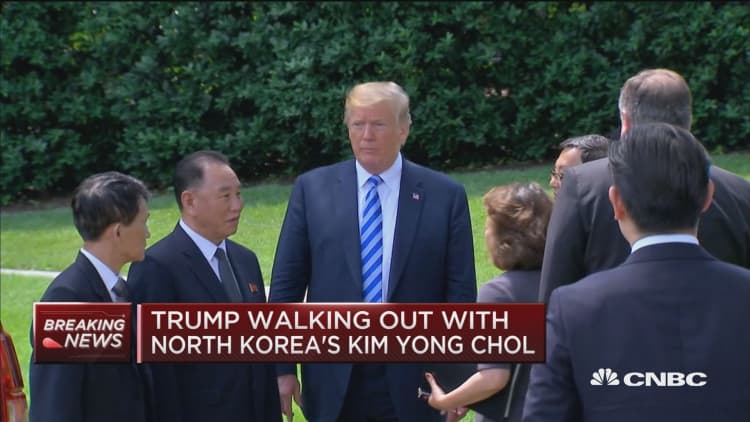
Trump told reporters Friday that the summit would go on as planned June 12 in Singapore, though he dialed back expectations of what it would entail, saying he no longer planned to use the phrase "maximum pressure" to describe his approach.
"I think it'll be a process," he told reporters following an Oval Office meeting with Kim Yong Chol, North Korea's top diplomat/chief negotiator. "I never said it goes in one meeting. I think it's going to be a process."
Chol had brought Trump a letter from Kim Jong Un that expressed the reclusive leader's interest in following through with the summit, The Wall Street Journal reported.
CNBC's Amanda Macias contributed to this report.
Watch: This expert says an unscripted US-North Korea summit is risky
